Nonprofit leaders face challenges at some point, regardless of their field. Changes in policies, funding, or the needs of the organization can happen suddenly. During uncertain times, staff and community members look to their leaders for support, guidance, and reassurance that they can overcome these challenges. This is when adaptive leadership skills are needed the most.
What is Adaptive Leadership?
Adaptive leadership consists of skills that help individuals stay focused when there are no clear answers or easy solutions. These leaders are open minded and quick thinkers who respond to change and emerging challenges confidently. Instead of sticking to fixed plans or abandoning plans when conditions change, adaptive leaders remain flexible, incorporate various viewpoints, and try new solutions.
Organizational resilience starts with adaptive leadership. It’s common for changes in policy, economics, technology, and industry innovations to disrupt expectations and require organizations to respond. That’s why leaders across all sectors must be prepared to meet challenges effectively and why we emphasize adaptive leadership skills as part of our annual Executive Leadership Institute.
Putting It Into Action
Principles of adaptive leadership offer a framework for handling complex and difficult situations when clear solutions aren’t present. These principles help leaders and organizations adapt and succeed in changing environments:
- Getting on the balcony means stepping back to gain a broader view of the situation. It involves noticing what’s happening with yourself, your team, your organization, and external factors affecting you.
- Identifying the leadership challenge: To find clarity amid uncertainty, you first need to determine the nature of the challenges you’re facing.
- Experimenting and taking smart risks: Stay open to new ideas and be willing to try different approaches based on the facts you have.
- Empowering others: You don’t have to tackle everything by yourself. Involve your team and share the workload.
- Leveraging conflict: Disagreements and varying perspectives can lead to valuable learning and innovation.
- Anchoring leadership in purpose: In stressful situations, it’s easy to lose focus. Stay grounded in your overall goals to guide your actions.
The principles are interconnected and reinforce one another. For instance, “getting on the balcony” helps you identify the leadership challenge, which can inform your experiments and risk -taking. Empowering others allows more individuals to contribute to the adaptive work, while leveraging conflict can uncover new ideas.
Practices
Alongside these principles, adaptive work involves various practices that can help you succeed:
- Diagnosing the Organization/System: Understand how your organization works and identify areas for improvement.
- Regulating Distress: Manage your emotional responses to difficult situations and maintain your composure.
- Maintaining Disciplined Attention: Focus on the most pressing issues.
- Giving the Work Back to the People: Empower team members to take ownership and find solutions.
- Protecting Voices of Leadership from Below the Hierarchy: Ensure that diverse perspectives are heard, regardless of level within the organization.
Staying Prepared
Practicing adaptive leadership is just as crucial as understanding its principles. When engaged in a difficult situation, stress and time constraints can make it hard to recall this information. The program provides Leaders with continuity of practice and application of adaptive leadership techniques to sharpen their skills. Here are some methods:
- Case Studies: Stay updated on how similar organizations handle unexpected changes. Reviewing these cases can reveal valuable leadership lessons. Done through student cohorts using Social Current’s online learning community.
- Simulations: Run practice scenarios to develop your decision-making skills and identify strengths, weaknesses, and potential outcomes in a less stressful environment. During virtual convenings, students have opportunities to apply adaptive skills to situations experienced across the sector.
- Role-playing: Engaging in role-play helps you practice communication and manage tough conversations. Group exercises support experiential learning while reinforcing the importance of feedback.
- Personal Reflection: Think about how you’ve responded to unexpected changes in the past. Reflecting on your experiences can help identify areas for improvement and effective strategies to apply. Self-awareness is essential to leadership development
Executive Leadership Institute
Adaptive leadership is a core component of Social Current’s Executive Leadership Institute (ELI), which is held in partnership with Loyola University Chicago’s Quinlan School of Business. Over the course of the program, leaders grow their knowledge and skills to effectively manage day-to-day operations and prepare for future challenges and changes.
Executives and senior managers learn how to lead more effectively in an ever-changing environment through a combination of academic instruction, real-world projects, mentorship. This year’s institute will be taking place June 8-12 in Chicago. Learn more about the institute online and register to join us at our informational session.
Further Reading:
- The Practice of Adaptive Leadership: Tools and Tactics for Changing Your Organization and the World
- Leading with Resilience: Mastering the Art of Adaptive Leadership in the Modern World
- Thomas Huber, PhD MS ECS
The mentorship program offered as part of Social Current’s Executive Leadership Institute (ELI) plays a pivotal role in developing transformative leaders. By pairing seasoned leaders with emerging talent, ELI creates a unique, supportive environment where knowledge sharing, personal growth, and professional development converge.

For this article, we asked an ELI mentor pair to share their experiences and shed light on the significant impact of their relationship on the broader leadership learning process. Mentor Kevin Walsh is a retired executive with 43 years of experience in child welfare, mental health, and juvenile justice in New York State, and mentee Althea Birch is the director of community programs at The Advocate Program in Miami.
Complementing On-Site Learning Through Mentorship
For many ELI students, the week of onsite learning is the foundation of their leadership journey. However, it is the mentoring component that provides the essential bridge to real-world application. According to Walsh, the in-person experience and additional virtual learning are crucial for providing a theoretical framework on leadership, but the program’s true value emerges when participants are encouraged to translate these lessons into action.
“While the onsite sessions provide critical insights into the challenges facing leadership today, working with a mentor allows the mentee to apply these concepts to real situations within their own organization,” Walsh explains. For example, Birch embarked on a project to expand her organization’s board of directors to include a member with lived experience. With Walsh’s guidance, this goal became not just a theoretical exercise, but a transformative action which reshaped Birch’s organization.

The focus on action-based learning is what sets ELI apart. Each student works on a project that requires them to implement the skills and insights they’ve gained, with their mentor acting as a neutral, experienced guide. “The mentor’s role is to help the mentee reflect on the challenges they face, not to solve the problem for them,” explains Walsh. This reflective process, which is central to adult learning, allows the mentee to deepen their leadership practice and approach issues from new perspectives.
Mentorship as a Personal Development Journey
Mentorship within ELI is not just about professional growth; it is deeply intertwined with personal development. The mentor shares their expertise and helps the mentee work through their leadership challenges. As Walsh highlights, “Mentoring is about guiding the mentee on a personal journey toward becoming a stronger leader.” This means fostering a space where mentees can think critically, voice their concerns, and reflect on their growth.
For the mentees, the experience is equally impactful. “Kevin was an unbiased sounding board,” says Birch, reflecting on the mentorship experience. “His guidance helped me make better leadership decisions.” The mentor-mentee dynamic offered Birch a chance to step back and analyze her leadership style, without the pressures of a supervisor-employee relationship. This created a safe space for reflection and growth.
Benefits to Both Mentor and Mentee
While mentorship is primarily focused on supporting the mentee’s development, mentors also benefit significantly from the experience. For Walsh, the chance to work with mentees has kept him engaged and connected to the evolving trends in the nonprofit sector. “I am constantly learning from my mentees,” Walsh shares. “Working with individuals facing different challenges keeps me sharp and connected to the changing landscape of leadership.”
For the mentee, the benefits are clear: Continuous support, expert guidance, and an opportunity to learn from someone who has walked the path before. “Kevin’s nonprofit leadership experience gave me a wealth of guidance,” Birch shares. “He helped me understand that even small accomplishments matter in leadership, and he gave me the encouragement to keep moving forward.”
Overcoming Challenges Together
Like any relationship, the mentor-mentee partnership can face challenges. Walsh reflects on early struggles with understanding the fine line between coaching and mentoring. “It was difficult at first to resist the urge to offer advice on how to solve problems,” he admits. “But the true role of a mentor is to help the mentee reflect, not provide direct solutions.” With practice and support from other mentors in ELI’s alumni community, Walsh honed his active listening skills, ensuring that he could better guide Birch’s self-reflection.
For Birch, challenges were minimal, but the consistency of open communication was key. “Kevin was always available and supportive,” she explains. “Even between our scheduled meetings, I knew I could reach out if I needed guidance.”
A Lasting Impact
Perhaps the most powerful aspect of the ELI mentorship program and the institute overall is the longevity of relationships with peers and advisors in the sector. The connections formed during the program do not end when students graduate from the institute. As Birch shares, “I know I can continue to reach out to Kevin throughout my leadership journey.” This enduring support is what makes ELI’s mentoring approach unique — it is not just about guiding participants during the course, but about establishing a lasting partnership for continued growth.
Learn More About the Executive Leadership Institute
The mentor-mentee relationships forged through ELI are more than just professional connections—they are partnerships that nurture personal growth, challenge assumptions, and develop leadership skills. These relationships provide a critical complement to the in-person and virtual learning experience, offering mentees the chance to apply new concepts in real-world settings while growing as leaders.
View details online for the 2025 Executive Leadership Institute, to be held June 8-12 at Loyola University Chicago.
To learn more about how you can develop your leadership skills and make a lasting impact, join our free informational webinar about the institute Feb. 20.
Social Current’s Knowledge and Insights Center is now offering access to the Next Big Idea Club. This virtual book club, curated by bestselling authors Malcolm Gladwell, Adam Grant, Susan Cain, and Daniel Pink, delivers the most important nonfiction books of the year. Through our online forum, you can dive deep into impactful ideas with 45-minute audio and video lessons. These lessons distill the essence of groundbreaking books, offering you a comprehensive understanding in a fraction of the time.
Social Current’s access includes highlights from the Next Big Idea Club’s collection of books, with a particular emphasis on:
- Workplace relationships
- Workforce resilience
- Improved communication and interpersonal connection
- Authentic approaches to diversity, equity, inclusion, and belonging
In this forum, featuring lessons from the books below, you’ll learn strategies and techniques that improve relationships with coworkers, clients, community members, and partners, in addition to your personal relationships away from work.
- High Conflict: Why We Get Trapped in Conflict and How We Get Out by Amanda Ripley
- Uncensored: My Life and Uncomfortable Conversations at the Intersection of Black and White America by Zachary Wood
- You’re Not Listening: What You’re Missing and Why It Matters by Kate Muphy
- No Hard Feelings: The Secret Power of Embracing Emotions at Work by Liz Fosslien and Mollie West Duffy
Access to the Next Big Idea Club is an exclusive benefit for Social Current Impact Partners.
Learn more about the benefits of becoming an Impact Partner online and by joining an upcoming informational webinar.
How to Access
Go to Next Big Idea Club: Better Relationships In and Out of the Workplace.
Social Current Impact Partners can access these lessons for free by logging into the hub. Log in to your existing account or create one if you are a new user. Once logged in, check out the resources list and click on the individual records to view.
Learn more about the Social Current Knowledge and Insights Center.
The important work of creating an equitable society where all people can thrive cannot be achieved without the support of diverse community-based partnerships. Global Volunteer Month, celebrated in April, provides a great opportunity to acknowledge and celebrate partners that donate time, resources, and expertise to make a difference in our communities.
Social Current is grateful for its corporate social responsibility partners, which bolster our network’s impact by engaging teams of corporate volunteers and generously donating resources.
Aramark
Social Current is grateful for our 16-year partnership with Aramark. Rooted in service and united by purpose, Aramark strives to do great things for its employees, partners, communities, and planet. Their global volunteer program, Aramark Building Community, engages the talents and passions of employees to develop solutions that address challenges caused by lack of access to healthy food and proper nutrition, financial insecurity, and inequitable environments. The program drives stronger communities, creates employee volunteer opportunities, and encourages employees to give back to their local communities.
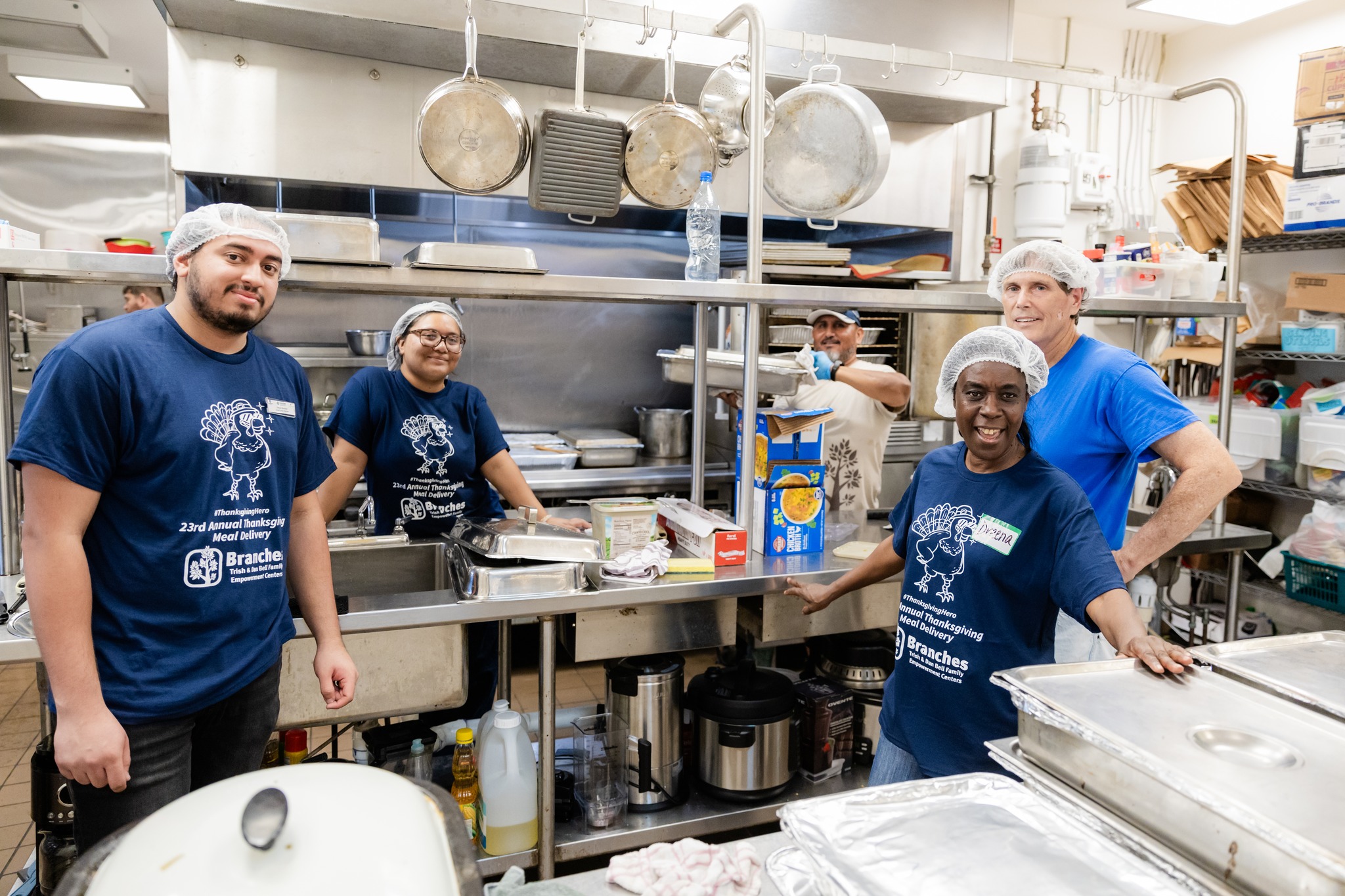 The Aramark Building Community grant program and team of engaged volunteers have been an incredible support for Social Current partner Branches in Miami, especially over the holidays. Aramark volunteers cooked, packaged, and delivered meals over Thanksgiving, while also purchasing and wrapping gifts for college students during the holidays.
The Aramark Building Community grant program and team of engaged volunteers have been an incredible support for Social Current partner Branches in Miami, especially over the holidays. Aramark volunteers cooked, packaged, and delivered meals over Thanksgiving, while also purchasing and wrapping gifts for college students during the holidays.
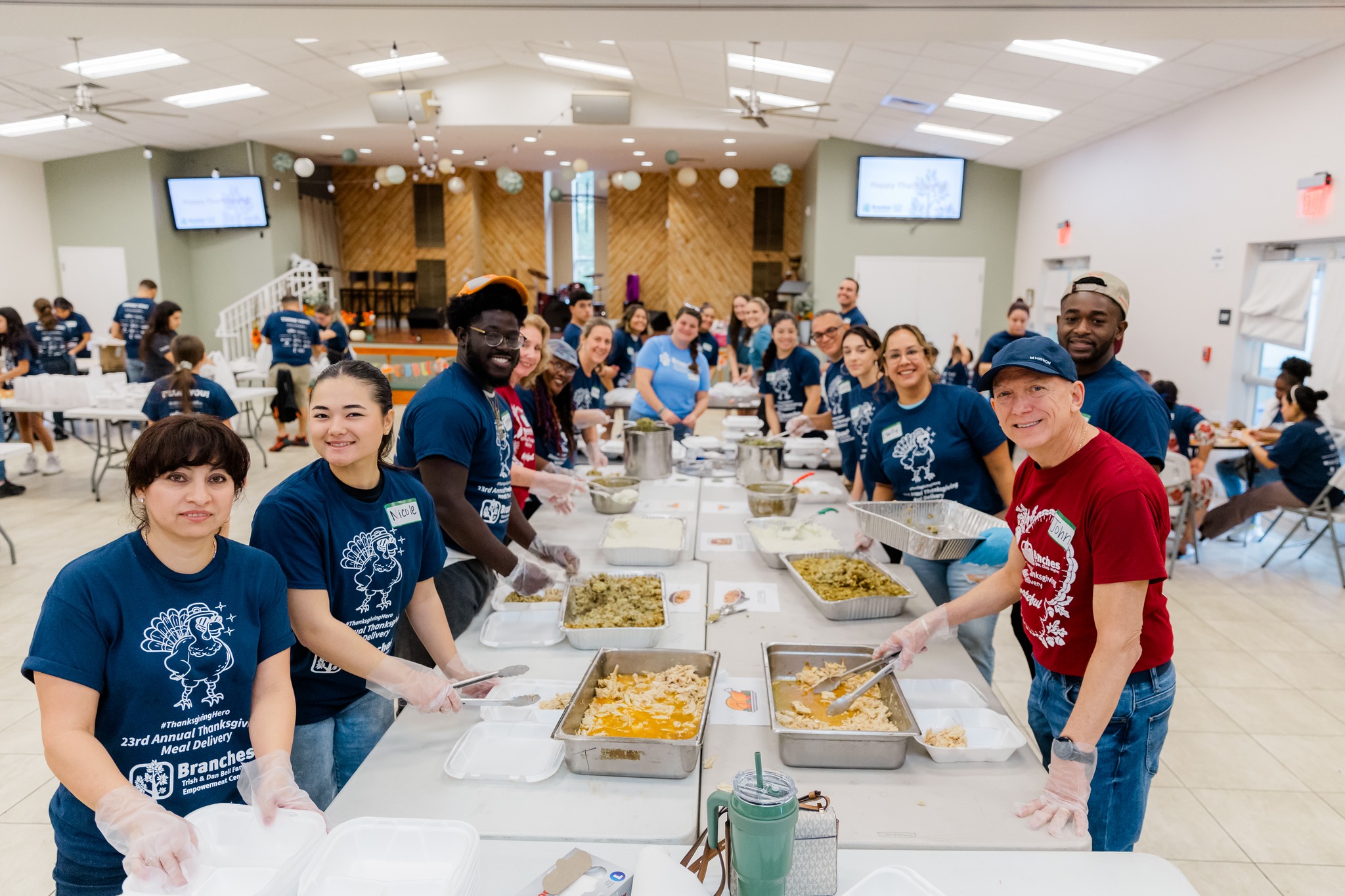 “We are continually grateful for the service-minded spirit of Aramark volunteers,” said Sarah Pattinson, associate director of development at Branches. “They come ready to serve the community and to tackle any project we present them with. They serve with joy and are always willing to go above and beyond for others.”
“We are continually grateful for the service-minded spirit of Aramark volunteers,” said Sarah Pattinson, associate director of development at Branches. “They come ready to serve the community and to tackle any project we present them with. They serve with joy and are always willing to go above and beyond for others.”
CSC ServiceWorks
Since 2021, Social Current has partnered with CSC ServiceWorks, the leading provider of laundry solutions and air vending services throughout the U.S., Canada, and Europe.
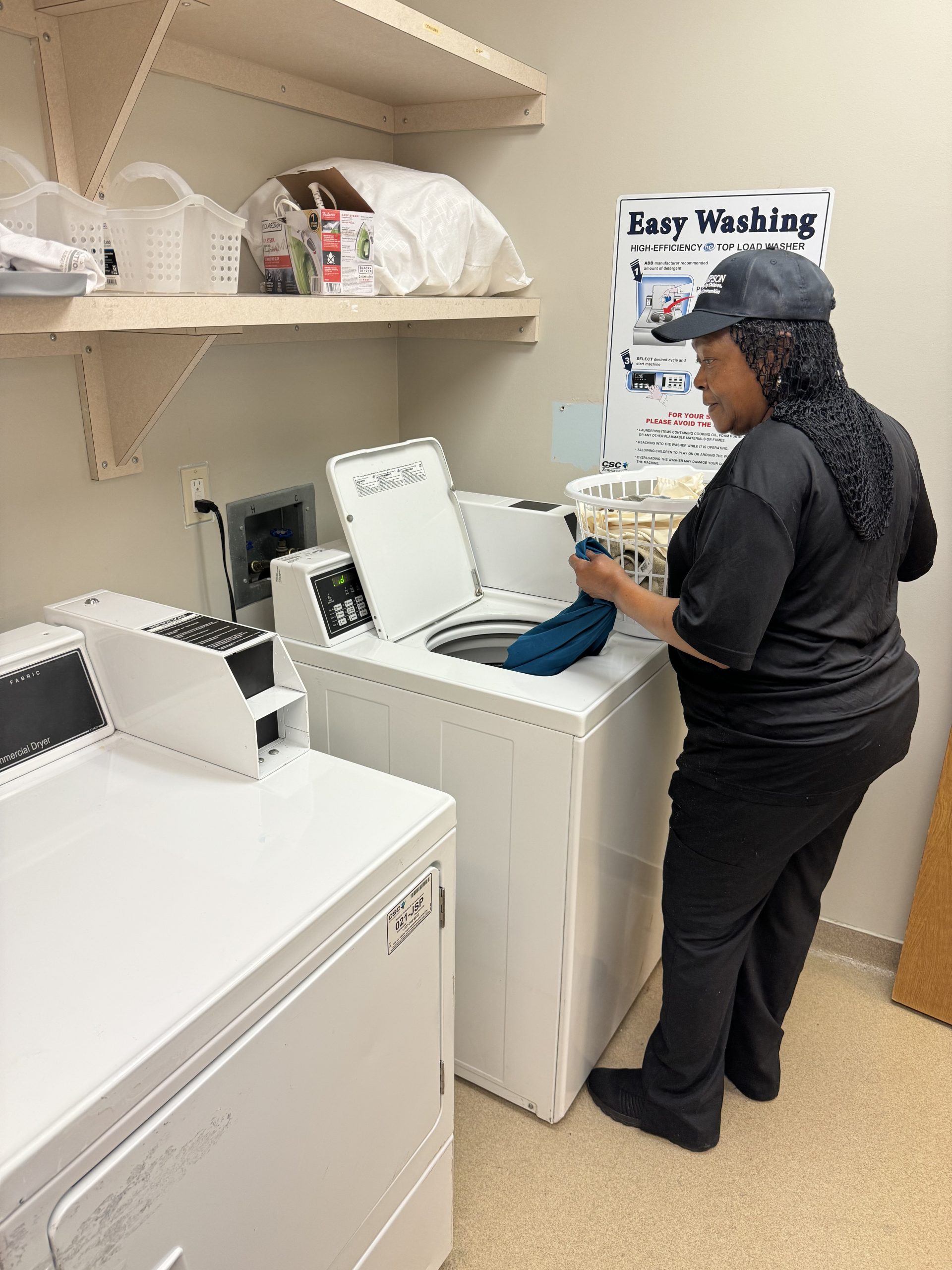 CSC CommunityWorks’ Signature Services program works with community organizations to provide reliable access to clean laundry and basic supports. They believe access to clean laundry is essential to helping people be successful in school and work as well as to maintain healthy lifestyles. CSC teams support their local community-based organizations by providing washer, dryer, air, and vacuum equipment; ongoing service for these machines; and volunteer support. Through their donations of washers, dryers, and ongoing equipment maintenance, CSC helps strengthen the capacity of Social Current partners who are providing essential services.
CSC CommunityWorks’ Signature Services program works with community organizations to provide reliable access to clean laundry and basic supports. They believe access to clean laundry is essential to helping people be successful in school and work as well as to maintain healthy lifestyles. CSC teams support their local community-based organizations by providing washer, dryer, air, and vacuum equipment; ongoing service for these machines; and volunteer support. Through their donations of washers, dryers, and ongoing equipment maintenance, CSC helps strengthen the capacity of Social Current partners who are providing essential services.
“The equipment [provided by CSC ServiceWorks] has allowed us to keep our laundry done in a timely fashion because our machines stay in operation,” said Danny Whitley, chief facilities officer at Thompson Child and Family Focus in Matthews, North Carolina. “We are 24/7 facility, and laundry is crucial to our care.”
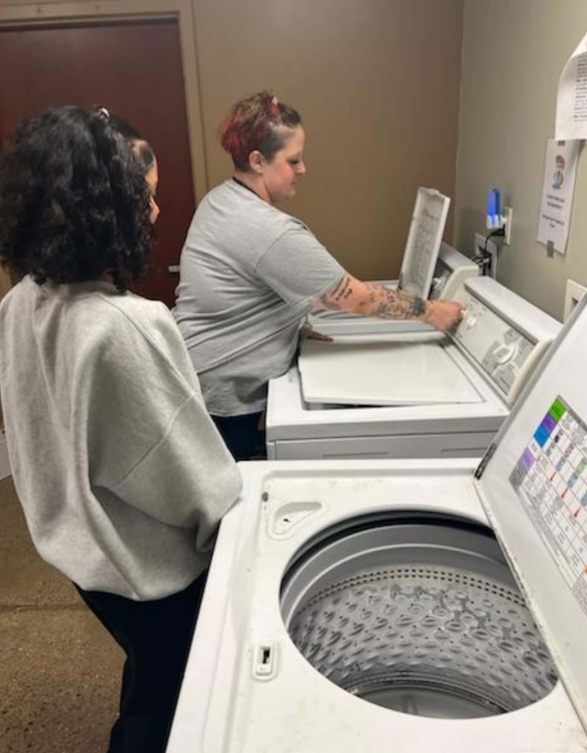 Rodney Prystash, director of facilities/operations at Auberle in McKeesport, Pennsylvania, shared, “The six high-quality washer and dryer units provided by CSC ServiceWorks have really helped meet the need for families residing at our homeless family shelters, and for the young women and men at our semi-independent living programs. The donated equipment and volunteer installations have allowed us to use resources for other critical items for those that we serve.”
Rodney Prystash, director of facilities/operations at Auberle in McKeesport, Pennsylvania, shared, “The six high-quality washer and dryer units provided by CSC ServiceWorks have really helped meet the need for families residing at our homeless family shelters, and for the young women and men at our semi-independent living programs. The donated equipment and volunteer installations have allowed us to use resources for other critical items for those that we serve.”
Social Current celebrates and thanks all of its corporate volunteers, working in partnership with our network of organizations and helping us implement equitable solutions to society’s toughest challenges. For questions about Social Current’s corporate partnerships, please contact Emily Merritt, senior manager of corporate partnerships.
Lauri Goldkind, associate professor at Fordham University, will lead a session on artificial intelligence (AI) in human services at the upcoming CEO Convening, May 1-3 in Detroit. During the session, she’ll help participants assess opportunities and challenges related to using AI in human services organizations. This rapidly developing technology holds promising benefits for greater efficiency and effectiveness; however, it must be implemented strategically. Participants will be introduced to the three main applications of generative AI, learn how to conduct an organizational readiness assessment, and consider the elements of an organizational AI policy.
Goldkind’s research interests include data justice, AI and data ecosystems in nonprofit management, and telemental health and human rights. She has coauthored two articles for Social Current’s journal, Families in Society: The Journal of Contemporary Social Services. The journal offers peer-reviewed content that continually advances the social work profession.
“That’s the Beauty of It”: Practitioners Describe the Affordances of Direct-to-Consumer Tele-Mental Health
Lauri Goldkind and Lea Wolf
Published 2021, Vol. 102 (Issue 4)
This qualitative study uses the framework of affordances, derived from James Jerome Gibson, to examine what social work practitioners working on direct-to-consumer tele-mental health (DTCTMH) platforms are discovering about the features, benefits, and constraints of virtual therapy.
An interpretive phenomenological approach was employed to document the lived experiences of social workers who practice in this manner. According to the practitioners interviewed, for a subset of individuals seeking treatment, DTCTMH can offer meaningful interpersonal interaction that confers benefit. Key affordances include accessibility, anonymity, meaningful work, autonomy, lifelong learning, and access by new populations. Practitioners simultaneously acknowledge the ethical complexities and structural challenges of DTCTMH practice. The article concludes with suggestions for future research, policy, and practice.
Selling Your Soul on the Information Superhighway: Consenting to Services in Direct-to-Consumer Tele-Mental Health
Lauri Goldkind and Lea Wolf
Published 2020, Vol. 101 (Issue 1)
The practice of on-demand digital psychotherapy presents ethical questions, as new economic models, service delivery systems, and therapeutic models are introduced. Virtual therapy, now offered on a subscription basis by third-party providers, requires users to accept terms of service (ToS) agreements.
This article describes the results of a survey in which participants (n = 579) were asked to compare the values of the Human Rights framework with the language of one tele-mental health platform’s ToS user agreement. Findings suggest that those clients with prior experience with a mental health professional will find the ToS agreements to be the most ethically compromised. Similarly, individuals who are employed and have attained a higher level of education also found the ToS to be ethically suspect. Of those who were surveyed, individuals who hold less education and those who are unemployed, may be at most risk for signing consent to a system they do not understand. The study provides one example of the ethical questions that emerge from the introduction of a new model of for-profit service provision in mental health. Recommendations for consumers and practitioners are suggested.
How to Gain Access to Social Work Research
Social Current’s Knowledge and Insights Center offers the research and resources human services professionals need to stay current on emerging trends, implement practices, and advance organizational excellence. One feature of the Knowledge and Insights Center is the complete collection of Families in Society journal content, dating back to 1920.
In addition, users have access to an extensive resource library with thousands of catalog records in more than 20 topic collections, EBSCOhost, and customized research requests with knowledgeable librarians.
The Knowledge and Insights Center is one of the many benefits of being a Social Current Impact Partner. Other benefits include convenings and networking opportunities, complimentary participation in our workforce resilience virtual learning series, and special cost savings on solutions from Social Current and our Strategic Industry Partners.
Organizations may also purchase access to the Knowledge and Insights Center.
Social Current and the American Public Human Services Association (APHSA) are excited to share progress on our effort to create a leadership framework for community-based and public sector human services leaders that will change the way we work together.
There is a need for a new operating paradigm that puts people at the center of the work, unlocking the power of community-led solutions. A change in how sector leaders work is foundational to advancing equitable, community-led outcomes.
Through focus groups, story gathering, a literature review, and the leadership experiences of both Social Current and APHSA, we have collected and synthesized a rich set of insights and impactful practices. From this collective input, we have been able to map the next generation of leadership competencies for human service leaders. By working from the traditional competencies that we seek to shift or amplify, we began to define/describe leadership competencies that are centered in people, community, and help make them actionable through specific examples.
We invite you and your community members with lived experience to participate in a virtual focus group in November or December. The sessions start Nov. 16. You can sign up here.
Initiative Update and Focus Groups for CEOs and Senior Leaders
Please join us to continue the dialogue. The focus groups will be 60 minutes long. During the session, facilitators will share an overview of the work and how the leadership competencies emerged. For the remainder of the session, participants will discuss how the competencies resonate with them; share their experiences, strategies, and innovations working in the human services sector; and identify how opportunities for improving services can be incorporated in the leadership behaviors or action.
View full details for CEOs and senior leaders and register here. Use this flier to share this opportunity with your team.
Focus Groups Community Members with Lived Experience
Please invite individuals in your communities to participate in these focus groups. We look to hear their perspectives around what makes them feel valued and heard, how to co-create practices and policies, how to improve service access, and how to address racial disparities. We will provide a stipend to individuals participating in these focus groups.
View full details for community members and register here. Use this flier to share this opportunity with your community.
Space is limited, so please register in advance. Only those who have registered in advance and received confirmation can attend.
If you have questions or need further details, contact Trinka Landry-Bourne of APHSA or Robena Spangler of Social Current.
Social Current and the American Public Human Services Association (APHSA) want to learn from human services leaders and individuals with lived experience to inform the way we work together.
We are conducting several focus groups on advancing equity, health, and well-being in our communities and need your help spreading the word to those who have accessed services from your organization. We seek to learn from their rich perspectives and experiences of feeling valued/heard, improving service access, and addressing racial disparities and inequities.
Focus groups are virtual, and will be offered throughout April and May:
People who have experience accessing services and resources offered by your organizations will be provided a participation stipend. Space is limited, so please register in advance. Only those who have registered in advance and received confirmation can attend.
We are truly excited about this work and hope the knowledge we gain from these focus groups will help us create a leadership framework for community-based and public sector human services leaders that will change the way we work together and across boundaries.
If you have questions or need further details, please contact Trinka Landry-Bourne at tlandry-bourne@aphsa.org or Michon Hicks at mhicks@social-current.org.
We want to hear from you! Human services leaders across the country are working to include the expertise of individuals with lived experience. In partnership with the American Public Human Services Association (APHSA), we’re seeking examples of such work to spotlight how others are engaging in efforts that help address structural racism, advance equity, diversity, and inclusion, and authentically center community to drive systems change. Learn more and submit your stories here.
We kindly request you submit your responses no later than Friday, March 31st.
If you have questions or need further details, please contact Trinka Landry-Bourne or Michon Hicks.
Strategic organizations are transformative organizations. They look beyond current experience to anticipate future trends and opportunities. They ask, “Why?” and evaluate answers within a future-oriented context. They expect to change.
Trendspotting and trend analysis can be powerful for strategic planning by creating credible illustrations of what the future might look like. Based on that, community-based organizations and their cross-sector partners can align community priorities and resources to help all people reach their full potential.
Incorporating a diversity of trends topics is particularly useful for creating a strategy where the end product is a long-term plan to be implemented over multiple years. Such plans aren’t just about identifying broad goals to be realized, but also key strategies for how the organization will meet those goals.
Designing Useful Trend Inquiry
Core to trendspotting is research, and two types of research—primary and secondary—are best for identifying data that can inform activities like strategic planning, risk assessment, and opportunity mapping.
Primary research is firsthand research using methods like interviews with consumers and program participants, employees, community leaders and advocates, academic subject matter experts, regulators, policymakers, funders, and other stakeholders.
Secondary research uses available data and information found in reports and databases from diverse industries, which can be used as sources for trend determination. Examples can include demographics and other census tract information, local asset mapping, state and federal data (e.g., Adoption and Foster Care Analysis and Reporting System [AFCARS]), and more.
The essential process of trend investigation is about asking the right questions about the right things. These can roughly be divided into three areas, with examples of questions below:
- Identification of trends. What are the trends we should follow? Are there any associated systems and disciplines we need to understand better before determining trend relevance?
- Analysis of the effects and possible projections.In which directions can a trend lead? What impact can a trend have on our strengths and weaknesses? Can we expect more or less support from partners and collaborators?
- Analysis of the implications.What do these trends mean for our community? How will child and family well-being change as a result? Do we have adequate organizational capacity in relation to this trend?
Getting the Most Out of Scenario Planning
Since no one can tell the future with 100% certainty all the time, developing robust scenarios can help bridge present circumstances with future requirements. The range and value of organizational opportunities based on trend analysis depend on scenarios that should include most of these criteria:
- Plausible. Logical, consistent, and believable
- Relevant. Highlighting key challenges and dynamics of the future
- Divergent. Different from each other in strategically significant ways
- Challenging. Questioning fundamental beliefs and assumptions
By evaluating relevant trends compiled through primary and secondary research and using the analysis to explore governance and operational scenarios, the ability to optimize programs and services and create achievable pathways to child and family well-being is strengthened.
Harnessing Trends
The Social Current Knowledge and Insights Center, available through our Impact Partnerships, helps professionals in human/social services to learn, improve, and innovate by providing timely, useful, and relevant information and resources. This is done by:
- Employing an evidence-first approach to evaluate and scan the knowledge base of an area of inquiry, especially scope, relevance, and utility
- Reviewing and evaluating information sources for credibility and thoroughness
- Working closely with subject matter experts to define specific questions to be answered, problems to be solved, or opportunities to uncover
- Systematizing the information in a way that users can quickly and easily understand
Professional librarians in the Knowledge and Insights Center routinely gather trends data on a variety of organizational topics, such as workforce resilience and service innovation, as well as meta trends that encompass demographics, systemic and environmental factors, technology, and more.
Hot Topics from 2022
Below are some of the key topics that have been monitored in 2022, with an insight summary, brief source examples, and related resources and offerings from Social Current:
Integration of Workforce Resilience as a Key Organizational Sustainability Strategy
Resilience is a buzzword and seen as necessary for workplaces. But can organizations improve employee resilience? Some think yes, others think no. “A resilience-oriented workforce spans many disciplines and training programs will need to reflect that. It requires a collaborative organizational model that promotes information sharing structures.”
Sources:
- What Leaders Get Wrong About Resilience
- Beyond Disaster Preparedness: Building a Resilience-Oriented Workforce for the Future
See Also:
- Partner with Staff to Build a Resilient Workforce
- Keeping Our Trauma Therapists Healthy with Vicarious Resilience
- Workforce Resilience Consulting
Providers Increasingly Incorporating Social Determinants of Health in Service Delivery
Social determinants of health (SDOH) and adverse childhood experiences (ACEs) profoundly impact lives of individuals. Both SDOH and ACEs are risk factors for childhood mental health disorders, health, and social outcomes. These factors include housing instability, food insecurity, poverty, community violence, and discrimination. There are ways to help address these risk factors, and this includes things like quality education, safe neighborhoods, and positive parent-child relationships.
Sources:
See Also:
- Social Determinants of Health Issue Brief
- Screening for Social Need and the Social Determinants of Health
- Health and Mental Well-Being SPARK Exchange
Biggest Public Health Threats to Teens Are Mental Health Disorders
Teenage pregnancy, smoking, binge drinking, drunken driving and smoking are no longer the biggest public health threats to teens. It is now rising rates of mental health disorders. With up to one in five children having a mental, emotional, development, or behavioral disorder, and rising rates of mental health visits in emergency rooms and depression symptoms rising during the pandemic, it is critical to pay attention to the mental health crisis in young people today.
Sources:
- Protecting Youth Mental Health: The U.S. Surgeon General’s Advisory
- Mental Health–Related Emergency Dept. Visits Among Children <18 Years During COVID-19 Pandemic
- “It’s Life or Death”: The Mental Health Crisis Among U.S. Teens
See Also:
Post-Pandemic Mental Health Crises Driving Change to Suicide Prevention Strategies
With rising rates of depression and anxiety compared to prior to the pandemic, the new U.S. suicide hotline 988 comes at a critical time. Suicide is a leading cause of death for people ages 10-34 years old, and 90% of those who died by suicide had a “diagnosable mental health condition at the time of their death.”
Sources:
- Depression and Anxiety Escalate During COVID
- 988 Key Messages; American Foundation for Suicide Prevention
See Also:
Successful Mental Health Interventions Are More Dependent on Cultural Responsiveness
Cultural competencies and cultural responsiveness for mental health providers is now seen as critical, even “a matter of life and death.”
Source:
See Also:
- Mapping Adolescents’ Community Histories
- See Why Incorporating Community Voices Achieves Equitable Solutions
Integrated Community and Systems Response Counteract School-to-Prison Pipeline
The school-to-prison pipeline is a “disturbing national trend wherein youth are funneled out of public schools and into the juvenile and criminal legal systems. Many of these youth are Black or Brown, have disabilities, or histories of poverty, abuse, or neglect, and would benefit from additional supports and resources. Instead, they are isolated, punished, and pushed out.”
Source:
See Also:
- Federal Public Policy Agenda: Policy Principles
- Advancing Equity SPARK Exchange
- Education Success SPARK Exchange
Other top trends recently updated by the Knowledge and Insights Center:
- Children in Poverty
- Adoption and Foster Care
- Substance Abuse
- LGBTQ Youth and Mental Health/Suicide
How to Access Our Specialized Researchers & Tools
As you plan for 2023 and beyond, make sure you’re utilizing all the tools in your toolbox. Join our Dec. 7 webinar for an in-depth overview of the Knowledge and Insights Center. For more information on the resources portal, including the Ask-a-Librarian reference request service, visit the Social Current Hub or contact the Knowledge and Insights Center.
About the Knowledge and Insights Center
The Knowledge and Insights Center offers a robust resources portal through the Social Current Hub, which includes a digital library with over 22,000 records; aggregated research and business databases; diverse topic collections and library guides; original content summarizing complex information; and coaching that helps users maximize these resources. Our team includes professional librarians with wide-ranging skillsets and extensive experience in collection development specific to the nonprofit social services sector.
Social Current, in partnership with the Hathaway Center for Excellence, is proud to offer the first in a series of APA and CAMFT continuing education eligible courses for practitioners working in and with the child welfare and therapeutic systems. The course is now available for on-demand registration and completion: Working with LGBTQ Youth and Young Adults.
This self-guided course is designed for front-line staff who are working with LGBTQ youth and young adults in community or residential settings. It focuses on how to:
- Intervene and reduce barriers to improve health outcomes
- Understand coming out experiences and the impact of rejecting and accepting behaviors
The course is eligible for 1 CE, as the Hathaway Center for Excellence is a continuing education vendor of the American Psychological Association (APA), or 1 CE, as the Hathaway Center for Excellence is a continuing education vendor of the California Association of Marriage and Family Therapists. Course participants receive their CE after completing all quizzes, post-tests, and evaluations associated with the course.
The cost is $75 per person. Organizations who are interested in sending five or more staff to this training should contact the Social Current Organizational Learning Team.
Enroll in this course online, or browse the Social Current learning catalog.
About the Hathaway Center for Excellence
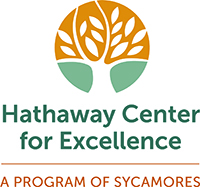
The Hathaway Center for Excellence (HCFE) is the esteemed research and training program of Sycamores. HCFE enables Sycamores to collect and share evidence-based research discoveries to clinical professionals across the U.S. and beyond, ensuring findings help to inspire informed care to all consumers in the therapeutic field.
Contact HCFE with questions about the content of this course.
About the Social Current Learning Exchange
Organizations that have developed courses related to social sector topics can gain exposure and revenue by sharing them through the Social Current Learning Exchange.
Social Current can assist you in converting your training to an online, on-demand course and offer it publicly through our learning catalog. We also can assist in promoting your course to our national network of social sector professionals.
If your organization is interested in making learning available via the Social Current Learning Exchange, contact the Social Current Organizational Learning Team.
